Items
Tag is exactly
immigrant
-
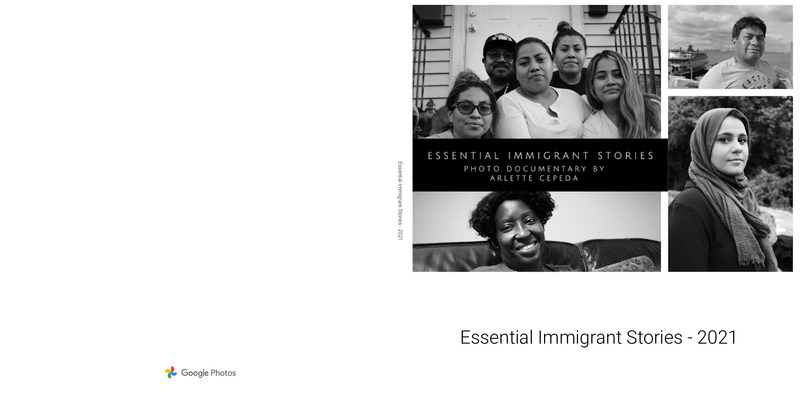 2021-09-11
2021-09-11Essential Immigrant Stories - Photo Book 2021
Essential Immigrant Stories is a photo-documentary project by visual artist and photographer, Arlette Cepeda, that focuses on highlighting the challenges and opportunities the COVID-19 pandemic has created for Staten Island’s immigrant community members through portraits and accompanying stories. The goal of this project is to elevate and validate the immigrant experience and their impact in our Staten Island community. “Through portraits and accompanying short stories, I'm interested in documenting the experiences of the often neglected, silenced or omitted immigrant population of this particular north-shore neighborhood.” “It is my hope that this project can help create awareness, increase empathy, acceptance and understanding of our otherness, narrowing the divide and discrimination often faced by immigrants.” - Arlette Cepeda -
2020-06-22
Milestone Year
To get to this story, I have to go back a few years first. I'm an immigrant from El Salvador. I came to the U.S. as a teenager in 1994, and never went back. I was in my 30s when I decided it was finally time to visit the grandmother I'd been missing for so long. I started to save and plan. Then she died. It took several years before I finally took my first trip back in November of 2019. I spent the time vacationing on the coast. I avoided my grandmother's house, my friends, and my family. I wasn't ready. But I decided that for my 40th birthday, in 2020, I'd return for a longer stay and visit my childhood home and all the friends and family left behind. Then there was a pandemic. The trip was cancelled, but it was the least of that year's problems. I lost my job and went back to school to start a new career. Our dog got cancer and died. My partner had a friend in El Salvador who died of COVID. I can never reschedule that same trip. Too much has changed. I'm planning to return this summer. This time with a firmer grasp on life's impermanence. I want to visit the white sand beaches at Playa Mango before it gets turned into a "surf city" tourist trap. I want to visit all the important cultural landmarks, especially those from which I can learn about my ancestors. More importantly, I will not avoid friends and family. On the contrary, I want to cherish the time I will have with them as if the next day isn't guaranteed. I plan to take dozens of photographs, portraits of everyone I see, I want to write down their stories in my journal, I want to record every visit, every meal, every experience possible in my journal. I plan to say "see you later," but not leave anything unsaid. Just in case. -
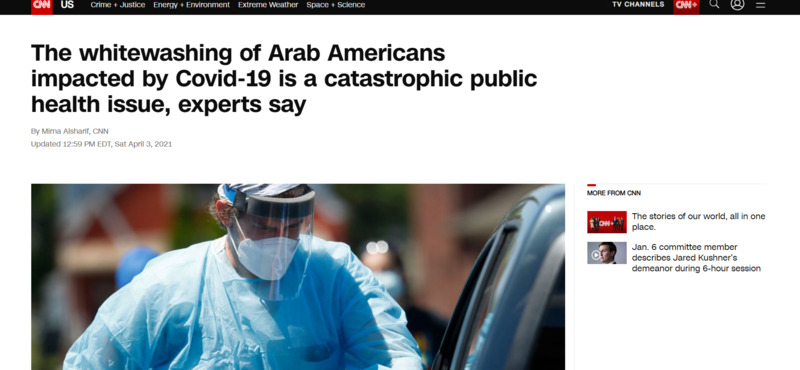 2021-04-03
2021-04-03The whitewashing of Arab Americans impacted by Covid-19 is a catastrophic public health issue, experts say
This article brings up important points regarding the underrepresentation of Middle Eastern and North African (MENA) people and communities in U.S. This article focuses primarily on Arab Americans, but also sheds light on the fact that there are no identifiers for Middle Eastern and North African people on the U.S. Census as their only options are to choose “white” or “other”. As a result, there is a lack of Covid-19 data specific to these communities which prevents support and information being directed to those underrepresented – and often socioeconomically underprivileged – groups. This article is important in demonstrating the vulnerability of this group. Many MENA families live in multi-generational homes, have preexisting medical conditions or risk factors which may make them more vulnerable should they contract Covid, and still some do not have access to the information and support needed to prevent Covid or to receive the proper treatment if infected. Additionally, because MENA people are not able to self-identify on the U.S. Census, the information about how these communities are being affected is not accurate. The U.S. Census isn’t the only place where these identifiers do not exist. Job, scholarship, and college applications (to name only a few) do not provide accurate identifiers for MENA individuals. I think this article is important in revealing the lack of identifiers available to MENA people and how important it is that this is changed soon. -
 2020-10-28
2020-10-28The Minimum Wage Spotlight
The photographic story I've uploaded is about my [family member], Andres, who even with the pandemic at its worst peak, in 2020, had to continue in his job. He's an Arizona field laborer, a key worker for the farm he works in. The conditions are difficult, with a minimum wage that doesn't match the amount of work he does. As the photos indicate, his job can start at a very early time when the sun hasn't even risen. His job usually lasts 12 hours, so when it's the night shift, he doesn't come back till the morning hours. There are weeks when he has to stay inside a hot tractor for hours and there are other days when he has to do a lot of moving and carrying around. Due to the difficult weather Arizona may have, there’s a constant danger of heatstroke especially since a lot of his work includes physical labor. Looking deeper, these pictures of the work Andres does feels like a representation of the unequal power there is in the minimum wage system. Here we have a field laborer, who due to lack of education and financial resources growing up, wasn’t able to reach for higher positions that require degrees. He grew up in a poverty-stricken family and alongside being a Latino immigrant, opportunities were few and far between so in order to assure he keeps himself and his family fed and sheltered, so he’s forced to continue a job that doesn’t contain the best conditions or pay. This is only emphasized within the pandemic, minimum wage workers forced to continue working in bad conditions including the risk of getting sick because, in order to keep their head above water, they must. And yet, even with all the dangers and the long hours, their pay doesn’t reflect the job. This also connects to race, minorities most of the time stuck in these places due to the disadvantages they grew up with and continue to face. It’s the life of an individual who is input in a life in which already starts with less compared to privileged others, and then a pandemic hits which only emphasizes the disadvantages already there. Overall, the pandemic truly has put a spotlight on the many issues society already had. -
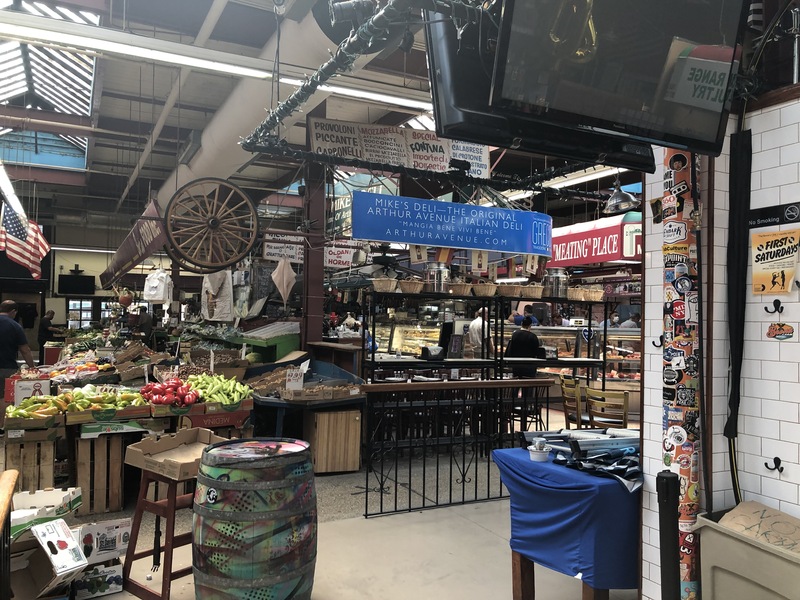 2021-06-18
2021-06-18A Linguistic Tour through Arthur Avenue
I traveled to New York this summer, and one of the places I visited was Arthur Avenue, located in the Belmont neighborhood of the Bronx and the main artery of the Bronx's Little Italy. Arthur Avenue provided a unique insight into the function of immigrant languages during the pandemic. Most of the people I heard talking as I walked down Arthur Avenue and went into the stores were speaking English, as would be expected in most of the United States. Some had an accent similar to a "standard" American accent/my Californian accent, while others spoke in New Yorker accents. I heard some people speaking Italian, mostly if not entirely elderly people, in several stores, including Cerini Coffee and Gifts. I also heard expression of language through music, in the form of a speaker in front of Mario's Restaurant playing "Tu vuò fà l'Americano" ("You Want to Be an American") and "O Sarracino" ("The Saracen"), two famous Neapolitan language songs. I didn't expect to hear music in Italian "dialect" (called so even though Neapolitan is a proper stand-alone language). However, Belmont is no longer just Little Italy. It also has a large Albanian presence. I saw a flyer on a street pole in Albanian which I presume to either be a missing sign or a flyer for a funeral. I have no idea what the flyer said because I don't know Albanian, but among the text were two pictures of an elderly man. In front of Randazzo's Seafood, I also saw a sign advertising some type of shellfish (I can't remember which) in Albanian and English, though not in Italian, which I thought was interesting since the store is owned by the grandchildren of immigrants from Sicily. There was also an Albanian television provider called TV ALB, which indicated to me that there are enough Albanian speakers in the area to sustain an Albanian-language cable or broadcast provider, even during the pandemic. I didn't hear any spoken Albanian. This could be a purely anecdotal observation, but I saw Italian primarily as a spoken language and Albanian primarily in writing. There was some writing in Italian, but most of it was either names of food items that couldn't be translated into English or sayings like "mangia bene vivi bene" ("eat well, live well", as a command; the picture of which is attached to this story) for promotional purposes. There was no actual communication occurring in written Italian. On a non-linguistic note, most of the restaurants also had outdoor seating under canopies, a consequence of COVID. -
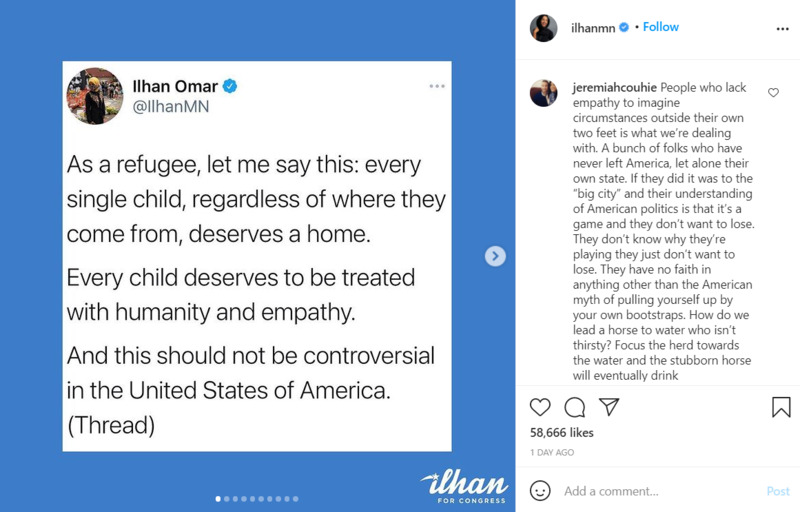 2021-03-21
2021-03-21Ilhan Omar Thread on Current Border Policy
People who lack empathy to imagine circumstances outside their own two feet is what we’re dealing with. A bunch of folks who have never left America, let alone their own state. If they did it was to the “big city” and their understanding of American politics is that it’s a game and they don’t want to lose. They don’t know why they’re playing they just don’t want to lose. They have no faith in anything other than the American myth of pulling yourself up by your own bootstraps. How do we lead a horse to water who isn’t thirsty? Focus the herd towards the water and the stubborn horse will eventually drink -
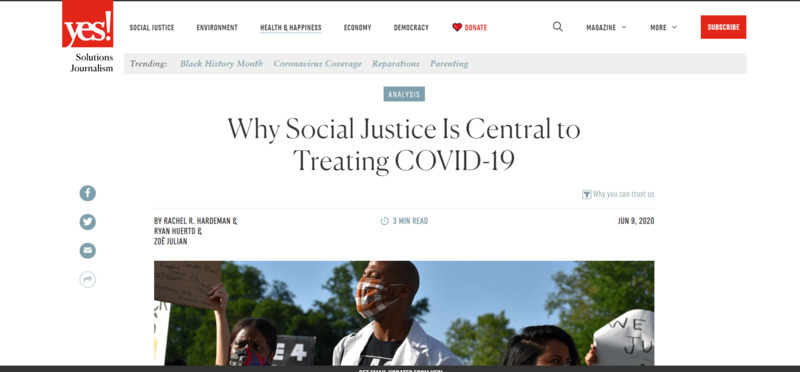 2020-06-09
2020-06-09Why Social Justice Is Central to Treating COVID-19
From article: Racism and classism create conditions where people of color, those living in poverty, and other marginalized groups have limited access to resources that affect health -
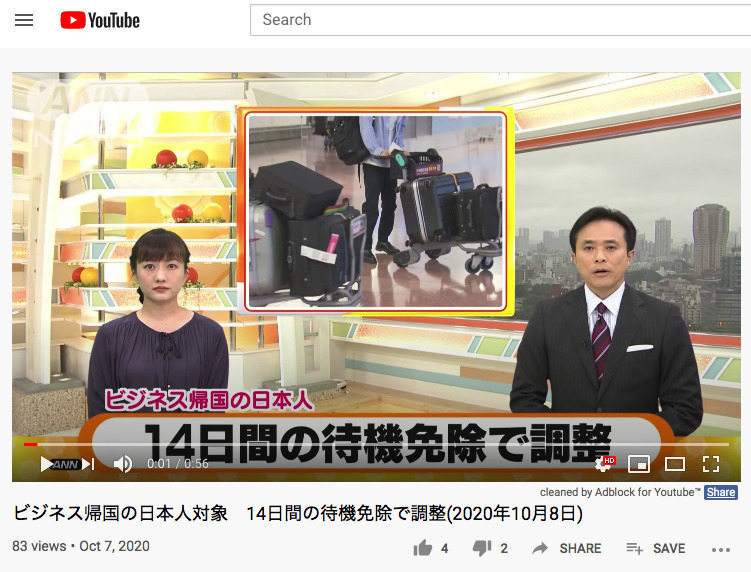 2020-10-07
2020-10-07ビジネス帰国の日本人対象 14日間の待機免除で調整(2020年10月8日) – Adjustment of 14-day quarantine period for Japanese returning to business (October 8, 2020)
This news is about if the Japanese citizen who have business trips outside of Japan meet certain requirement, the 14-day quarantine will be exempted. 政府は新型コロナウイルス対策で実施している入国者の14日間の待機措置について、ビジネスから帰国した日本人が条件を満たした場合には、免除する方向で調整していることが分かりました。 待機措置の免除には、帰国時に検査をするほか、帰国後14日間の行動計画の提出、公共交通機関を使わないことや移動を自宅と勤務先に限定することなどが条件となります。ビジネス上の妨げとなっていた帰国時の14日間の待機措置だけでも免除することで、海外出張しやすい環境を整え、経済活動の再開を後押しする狙いがあります。政府は引き続き各国と出入国制限の交渉を続け、ビジネス往来の要件緩和を目指す方針です。 As a method to prevent the spread of the new coronavirus by having a 14-day quarantine period, the government is moving in the direction of exemption of this period for Japanese immigrants returning from business if they meet certain conditions. The conditions include taking the test when returning to Japan, submission of an action plan for 14 days after returning to Japan, not using public transportation, and limiting the traveling to only between home and work. By exempting the 14-day quarantine period when returning to Japan, which has been a hindrance to business, the aim is to create an easier condition that allows overseas business trips and to bring back the economy. The government will continue to negotiate immigration restrictions with different countries, aiming to ease the requirements for business travels. -
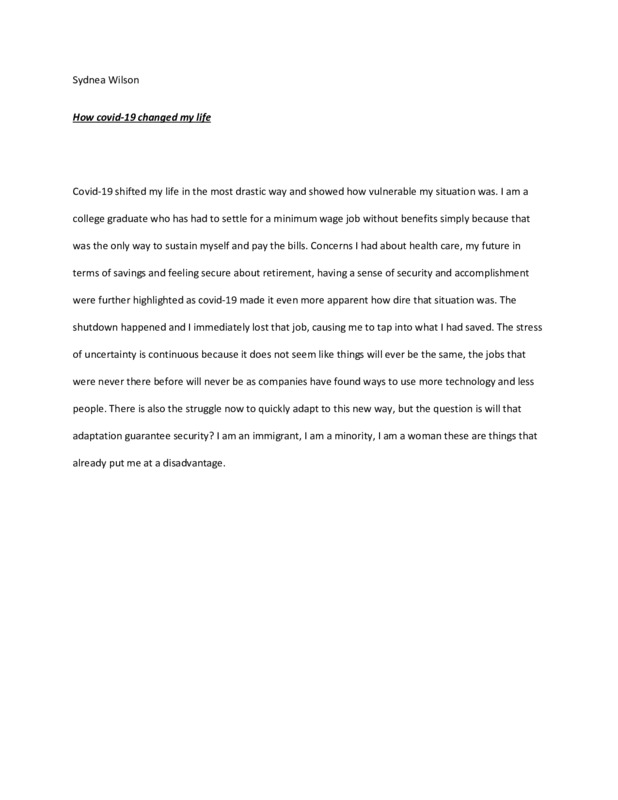 2020-09-27
2020-09-27How covid-19 changed my life.
It is important because it affected my employability. -
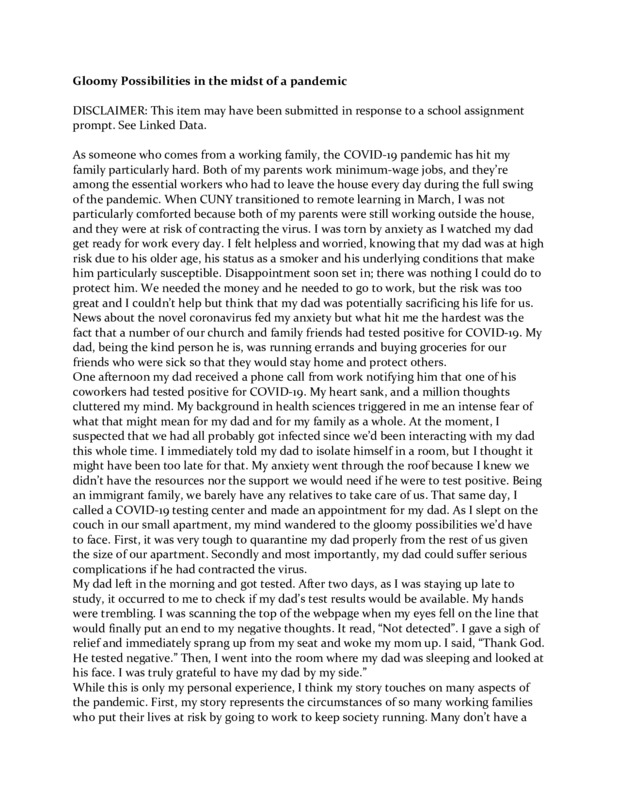 2020-05-20
2020-05-20Gloomy Possibilities in the midst of a pandemic
As someone who comes from a working family, the COVID-19 pandemic has hit my family particularly hard. Both of my parents work minimum-wage jobs, and they’re among the essential workers who had to leave the house every day during the full swing of the pandemic. When CUNY transitioned to remote learning in March, I was not particularly comforted because both of my parents were still working outside the house, and they were at risk of contracting the virus. I was torn by anxiety as I watched my dad get ready for work every day. I felt helpless and worried, knowing that my dad was at high risk due to his older age, his status as a smoker and his underlying conditions that make him particularly susceptible. Disappointment soon set in; there was nothing I could do to protect him. We needed the money and he needed to go to work, but the risk was too great and I couldn’t help but think that my dad was potentially sacrificing his life for us. News about the novel coronavirus fed my anxiety but what hit me the hardest was the fact that a number of our church and family friends had tested positive for COVID-19. My dad, being the kind person he is, was running errands and buying groceries for our friends who were sick so that they would stay home and protect others. One afternoon my dad received a phone call from work notifying him that one of his coworkers had tested positive for COVID-19. My heart sank, and a million thoughts cluttered my mind. My background in health sciences triggered in me an intense fear of what that might mean for my dad and for my family as a whole. At the moment, I suspected that we had all probably got infected since we’d been interacting with my dad this whole time. I immediately told my dad to isolate himself in a room, but I thought it might have been too late for that. My anxiety went through the roof because I knew we didn’t have the resources nor the support we would need if he were to test positive. Being an immigrant family, we barely have any relatives to take care of us. That same day, I called a COVID-19 testing center and made an appointment for my dad. As I slept on the couch in our small apartment, my mind wandered to the gloomy possibilities we’d have to face. First, it was very tough to quarantine my dad properly from the rest of us given the size of our apartment. Secondly and most importantly, my dad could suffer serious complications if he had contracted the virus. My dad left in the morning and got tested. After two days, as I was staying up late to study, it occurred to me to check if my dad’s test results would be available. My hands were trembling. I was scanning the top of the webpage when my eyes fell on the line that would finally put an end to my negative thoughts. It read, “Not detected”. I gave a sigh of relief and immediately sprang up from my seat and woke my mom up. I said, “Thank God. He tested negative.” Then, I went into the room where my dad was sleeping and looked at his face. I was truly grateful to have my dad by my side.” While this is only my personal experience, I think my story touches on many aspects of the pandemic. First, my story represents the circumstances of so many working families who put their lives at risk by going to work to keep society running. Many don’t have a choice but to continue working amidst the dangerous conditions. Here’s the reality, the pandemic has disproportionately affected those with low socioeconomic status either because they’re unable to stay safely at home or because they lack access to healthcare and other resources, which contribute to poorer health status overall. As someone studying health sciences, I’m interested in looking at the association between socioeconomic determinants and health outcomes. The pandemic has shed light on certain inadequacies that we could hopefully remediate in the future. This experience has taught me to appreciate my loved ones more than ever, and it has shown me that we should stand with each other in times of adversity like my dad did with his neighbors. While I was lucky that my family and I were healthy, the panic of a potential loss gave me a taste of what my community has been going through. My heart aches for the families that lost loved ones to the pandemic and particularly for those who had scarce resources to protect and support themselves. -
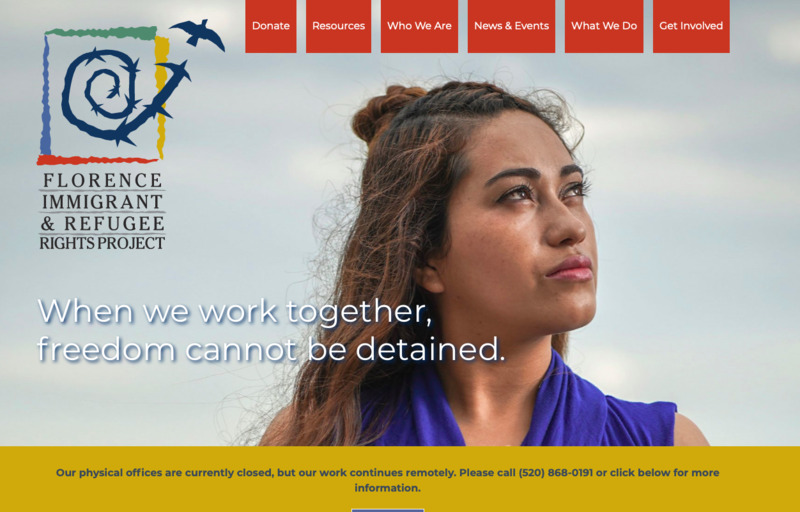 2020-09-14
2020-09-14Florence Immigrant & Refugee Rights Project
The Florence Project is a 501(c)(3) nonprofit legal service organization providing free legal and social services to adults and unaccompanied children in immigration custody in Arizona. Although the government assists indigent criminal defendants and civil litigants through public defenders and legal aid attorneys, it does not provide attorneys for people in immigration removal proceedings. As a result, an estimated 86 percent of the detained people go unrepresented due to poverty. The Florence Project strives to address this inequity both locally and nationally through direct service, partnerships with the community, and advocacy and outreach efforts. -
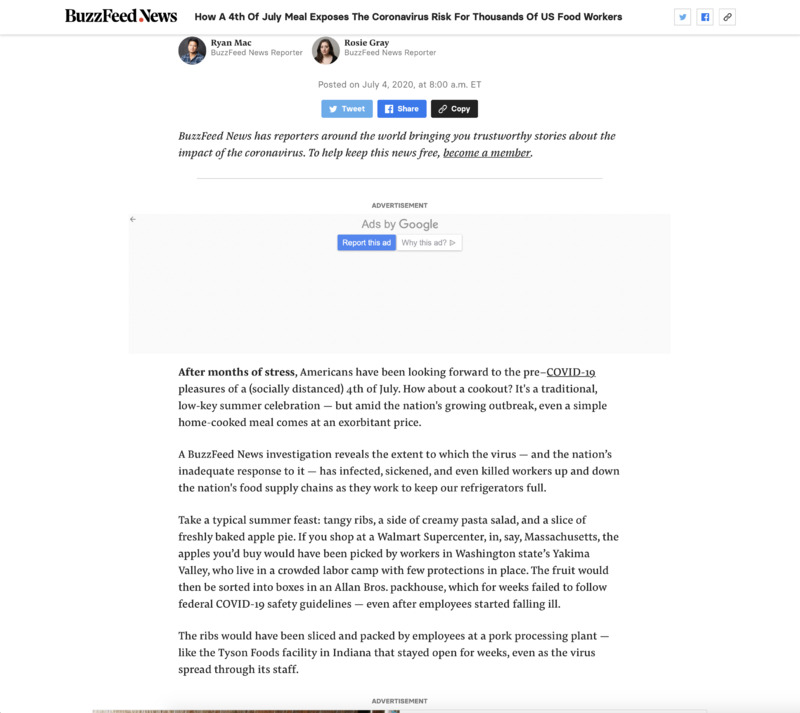 2020-07-04
2020-07-04Who Died for Your Dinner?
Foodservice has been glorified in recent months for its workforce staying on the front lines and stocking the shelves that hoarders quickly cleanout, picking apples, or working in food factories. This article details the cost of human life along the food supply chain in order to keep Americans fed. -
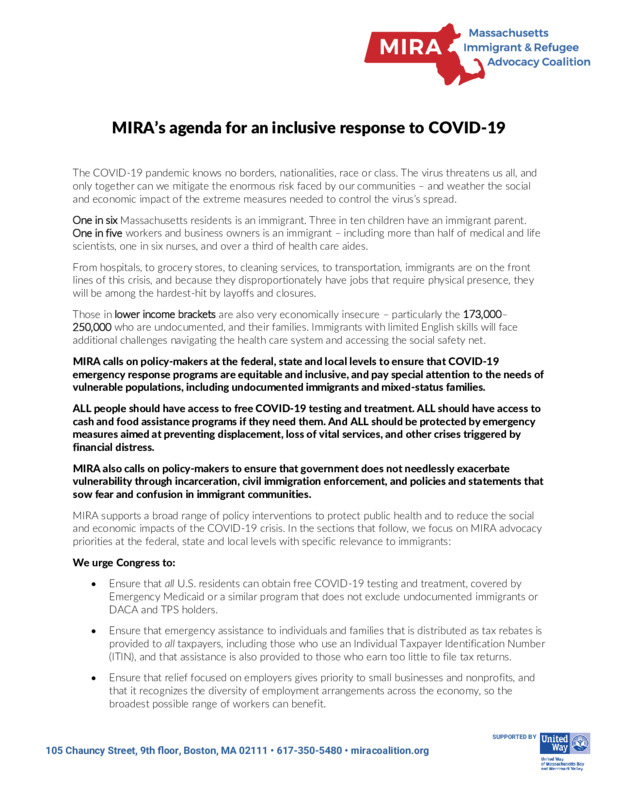 2020-03
2020-03MIRA’s agenda for an inclusive response to COVID-19
The Massachusetts Immigrant and Refugee Advocacy Coalition collected a series of helpful documents for immigrants and refugees in Massachusetts about the COVID-19 pandemic. At the start, they created an agenda on how the federal and local governemnts should react to the pandemic in relation to immigrant communities. Part of the agenda calls on Trump to release detainees that cannot be kept safe, but as the news as shown, ICE continues to detain immigrants and some have died in detention centers of the virus. -
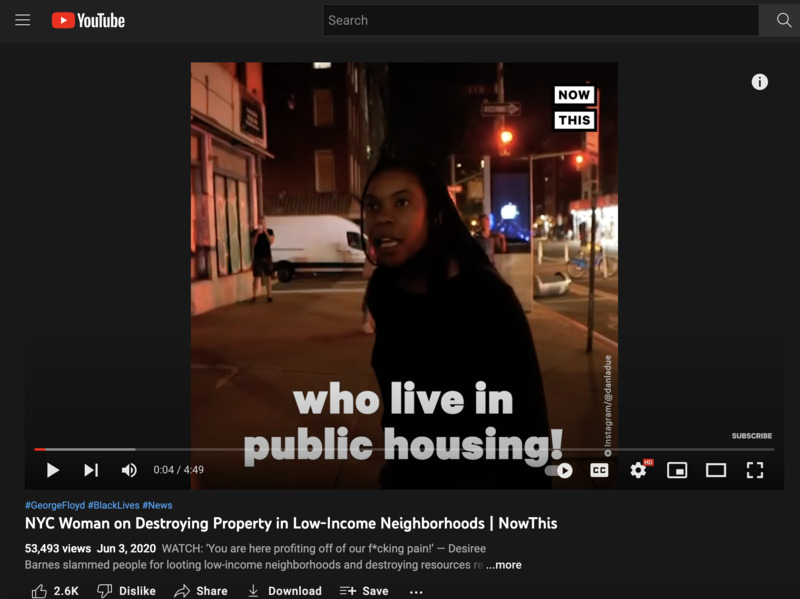 2020-06-03
2020-06-03NYC Woman on the Destruction by Protesters of Low-Income Housing
Her frustration and pain are evident in every movement, and word she speaks. -
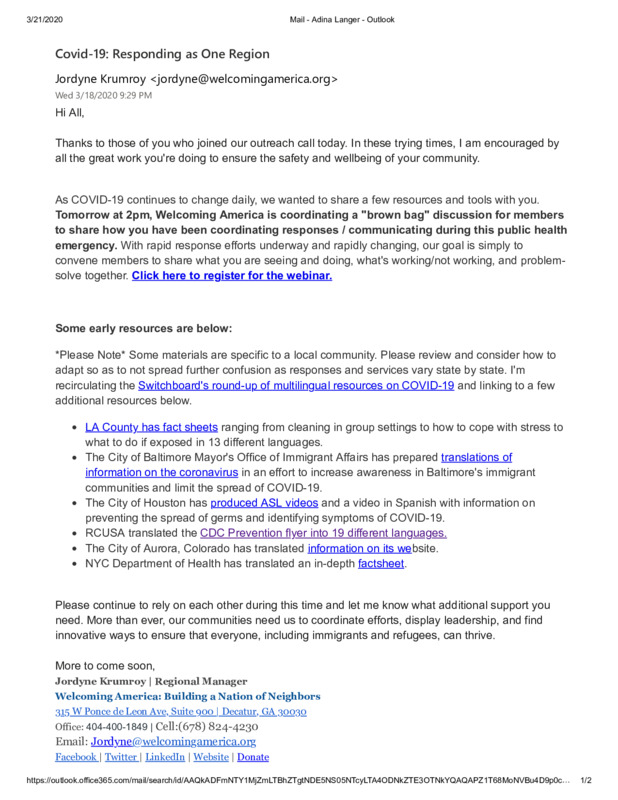 2020-03-18
2020-03-18Covid-19: Responding as One Region
Email from the leader of Welcoming America's One Region subcommittee to share resources for members in metro Atlanta to help vulnerable populations in their municipalities and other networks respond effectively to the COVID-19 crisis--- especially multilingual resources.
